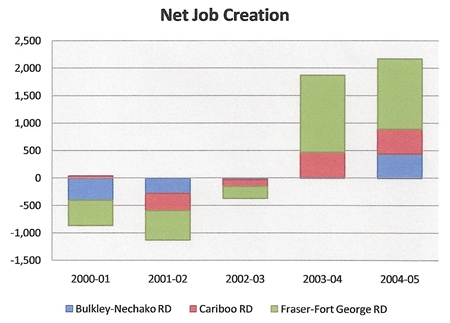Developing a Plan To Diversify
By 250 News

Graph illustrates net job creation in three regional districts
Prince George, B.C. - The 16-97Economic Alliance has completed its report which will be the base line to see if the region is making progress in its efforts to diversify the economy.
The report has some good news.
- There has been a net job creation of 2,170 jobs in 2005 in the 16-97 region
- There is a higher percentage of population in the workforce compared to the Provincial average
- When it comes to percentage of total employment, forestry is number 6 in the top six categories
- 1 – Manufacturing 16%
- 2 - wholesale and retail trade 15%
- 3 – Health care and social assistance 10%
- 4 – Accommodation and food services 8%
- 5 – Education Services 8%
- 6 – Forestry, Fishing , Mining, Oil and Gas 6.5%
- There have been 736 businesses incorporated in 2006, that’s a 19 % increase over 2005
- The assessed property values are up, sitting at $7.37 billion for 2006
Why are these points important? It’s all about diversifying the economy of the communities on the Highway 16 and Highway 97 corridor.
The 16-97 Alliance puts it this way; If you have one grape, well, you have one grape, there’s not much you can do with it. If you have a “cluster” of grapes, the picture changes, you can suddenly, make wine, and that is what this is all about. Identifying the numbers of individual businesses who, if they worked together, would have more strength in numbers is a key point to planning diversification.
That would give industries the power to expand their industry. For example, that could mean changing the kinds of programs offered at post secondary educational institutions to help produce the kind of workers needed for those “clusters” that are showing growth.
“There is also the advantage of a region having a plan” says Kathy Scouten of Initiatives Prince George and Chair of the Steering Committee for the 16-97 Alliance. “Investors like to know what kind of work force is available, what other support services and businesses are in the area.”
The eight month research project identified that mining and oil/gas production are emerging , while wood products manufacturing, tourism, transportation and warehousing are transforming.
The report says the top three things needed to move forward, are:
1. Systems for business, educators and government to work together
2. Access to capital
3. Physical infrastructure
The second stage of the Alliance’s work will develop and implement ways to expand the “cluster” industries identified.
Previous Story - Next Story
Return to Home










Goodtimes..!!
:-)